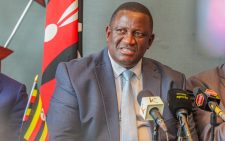South Sudan’s conflict is not just between societies

The United Nations (UN) Human Rights Council (HRC) will next week decide whether to renew mandate of the Commission on Human Rights in South Sudan (CHRSS) – presently the only credible mechanism to collect and preserve evidence of human rights violations and crimes under international law in South Sudan, with a view to ensuring accountability.
Next month, the UN Security Council (UNSC) will reconvene to consider implementation of the arms embargo it imposed on South Sudan’s territory in 2018, which expires on May 31. As HRC and UNSC member states prepare their positions, they need to reflect carefully on the nature of the violent conflicts in South Sudan that continue to have a devastating impact on civilians.
Violent conflicts in South Sudan almost always involve human rights violations and abuses and crimes under international law. They are a primary cause of the dire humanitarian situation in the country.
South Sudanese Government claims that the high levels of violence that continue to destroy lives is all “inter-communal violence”, or solely between opposition groups, suggesting that it has no connection at all to the armed conflict that broke out in 2013 or the peace deals brokered to end it. It also suggests that the government plays no role in much of this violence and related violations.
This narrative ignores that conflicts in South Sudan are caused by ethno-political wrangling and competition amongst the elite over access to power and financial resources. This narrative conveniently overlooks the government’s use of local armed actors as proxies to fight their battles, including weakening the opposition, and pays no heed to the government’s complicity in the entrenched impunity fueling these cycles of violence.
Looking just at 2022, the renewed violence in Unity, Upper Nile and parts of Jonglei states makes this clear. The latest cycle of violence that erupted in 2022 in southern Unity State, resulted in yet another round of horrific human rights violations and abuses, and was “driven by the ferocity of national political competition and abetted by impunity for past violations”, according to CHRSS.
One of the politicians alleged to be most responsible for the violations in southern Unity State in 2022 is the same individual implicated in violations, documented by Amnesty International, that were perpetrated in the same areas in 2018.
Most recent violence in Upper Nile State and parts of Jonglei, involving attacks against civilians documented by CHRSS was triggered by breakdown of the SPLA-IO breakaway faction known as the Kitgwang group caused by disagreement between two generals over integrating their forces with the army under Chapter 2 of the peace deal. Government actors, who had been pitting feuding elites against each other to weaken the opposition, were quick to marginalise one of the generals.
Ethnic armed militias and community defense forces aligned to the generals and government clashed and attacked civilians, including by shelling those who had gathered in displacement sites and engaging in sexual violence. This resulted in yet another round of the conflict-related violence citizens in Upper Nile have endured for decades. The army gave free passage to the general who sided with them even as his forces moved to attack civilians. Since the start of the conflict in 2013, no one has been held to account for crimes under international law. Last week, an analyst warned of renewed armed conflict in this area. Much of the current violence is clearly not “inter-communal violence” or solely between opposition groups. The South Sudanese government is further endangering its people by continuing to push this narrative and failing to hold perpetrators to account. By characterising the current violence as “inter-communal”, or fighting between opposition groups, the government misleads institutions such as the African Union and the UN and increases its chances to continue to evade consequences for its actions.
— Tigere Chagutah is Amnesty International’s acting regional director for East and Southern Africa












